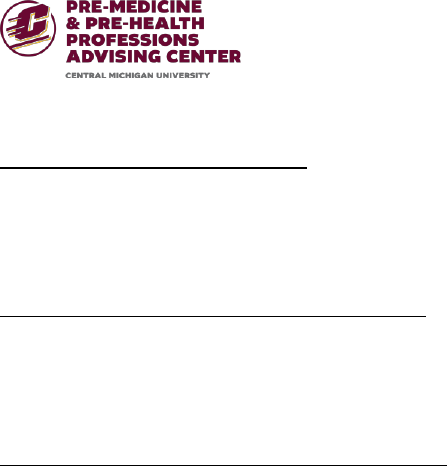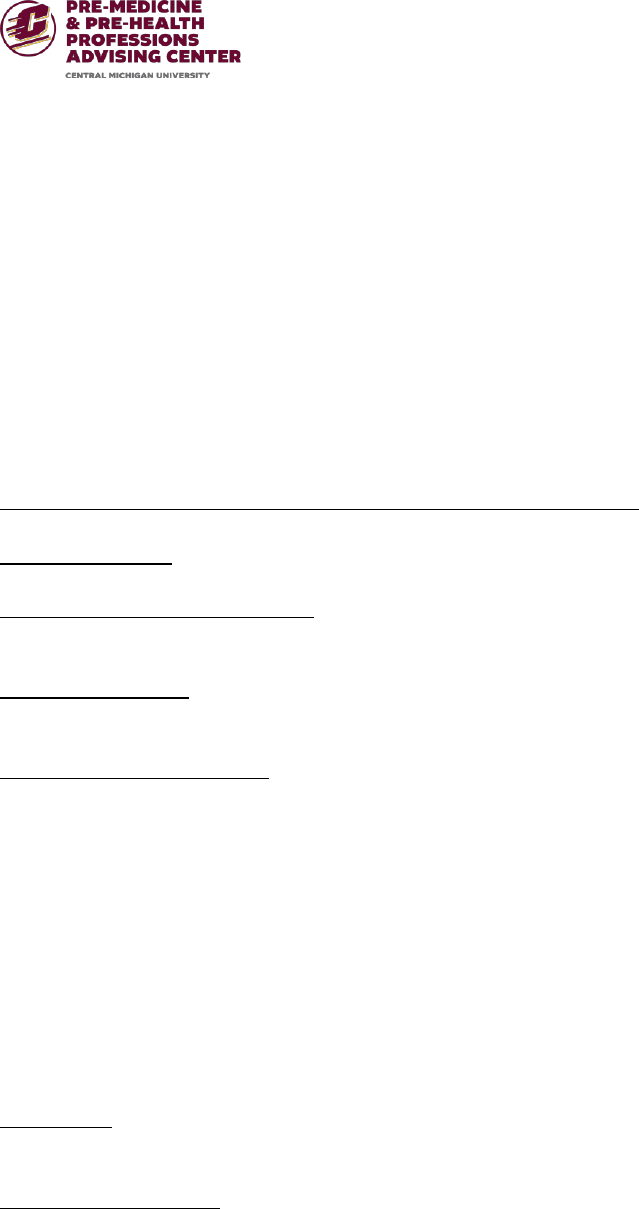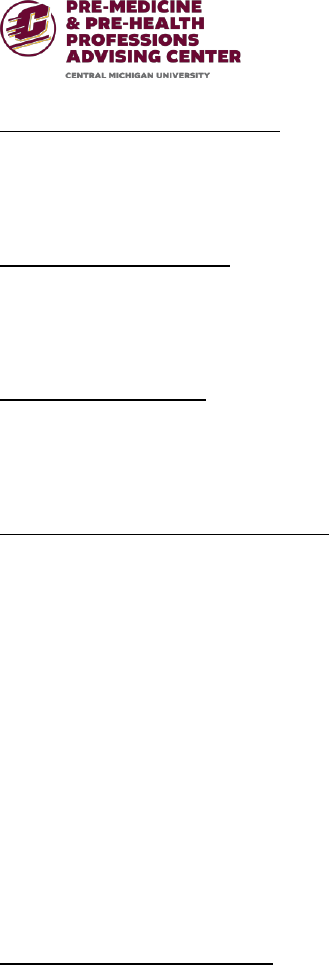
Updated: 2022-23
WRITING A PERSONAL STATEMENT
What is a Personal Statement?
A personal statement is your introduction to the selection committee. It provides them information on
why you are pursuing this career while giving them a sense of who you are. The personal statement tells
your story, who you are as a person – your values, interests, and goals. Your statement should enhance
your application and is an opportunity for you to support other parts of your application.
Why is the Personal Statement Important?
You will be applying with other students who may be academically similar to you. The personal
statement can help you to stand out in a positive way. Simply by telling your story, you have the
opportunity to highlight your uniqueness and how you will positively contribute to the health
professions community.
Themes to Avoid in Your Personal Statement
• Clichs: “I like science and want to help people.” – This is a job requirement, not something that makes
you stand out.
• Epiphany into Healthcare/Manifest Destiny: Your pursuit of the health professions should be a result of a
series of thoughtful, conscious, and reflective decisions, not an instantaneous realization or something
you’ve “always known”.
• The Narrative Resume: Do not rehash all your activities and achievements. Your statement should focus
on one or two significant experiences that offer sincere insight into you.
• Grandiosity: While it’s good to have goals, claiming in your personal statement that you are going to
“cure cancer” or “eliminate healthcare disparities” shows a lack of understanding of the problem you’re
planning to solve.
• Excuses: There are much better uses for your personal statement than justifying poor grades, conduct
violations, etc. However, if you choose to address this issue, make it brief and focus on what you learned
from the incident.
• Name Dropping: Your experiences are what make you unique, not who you know. Keep the focus on
you.
• Inflammatory/Controversial Remarks: You do not know the values, beliefs, and background of the
person who is reading your essay. Refrain from making strong statements on politics, religion, and other
polarizing topics.
• Lies: This not only includes blatant lies, but also includes providing information that may be factually
accurate but is presented in a misleading way. It will not take an admission committee long to figure out
when you are embellishing. Be authentic.
• Quotations: You have around 5,000 characters for your personal statement. Don’t waste them using
someone else’s words.
• Unusual Format: Do not try to stand out by using an unusual format. Do not submit artwork, videos, or
poems. You do not need gimmicks to stand out.
• Experience providing any treatments you are not licensed to provide: If you have ever participated in
treatments while shadowing or volunteering do not discuss this experience unless you are licensed.

Updated: 2022-23
Steps for Writing Your Personal Statement
This process will be different everyone, but these steps can guide you through the process of telling your
story.
STEP 1: REFLECT – Take a moment to assess why you want to join this profession. If you’ve kept a
journal from your activities, review it. Use the following questions to help guide your reflection.
Motivation: Why are you applying? What inspires you to pursue this profession? What makes you so
passionate about this?
Fit: What are your values? How do your values align with the values of the profession? What personal
qualities do you have that will enable you to positively contribute to the profession?
Capacity: What are your most defining experiences? What competencies did you develop through these
experiences? What have errors/regrets taught you about yourself? How have you changed/grown from
your experience
Vision: What do you want to do and be professional speaking? What impact do you want to have?
STEP 2: BRAINSTORM – Start thinking about what you want your central message (theme) to be. Set
aside time when you will not be rushed. Read the PERSONAL STATEMENT question/prompt (see below
for examples for each pre-health pathway). Use notes from your reflection to start grouping thoughts
and look for an emerging message/theme. This is your personal statement so think about what aspects
you want to convey.
Possible starting points:
• Explain your clinical experience and what you have learned about patient-provider relationships.
• Describe a diverse/unique experience and how it shaped you.
• Think about how your volunteering experiences. How can you apply your altruism to medicine?
• Think about a leadership role you have played and how it challenged you.
• Athletes: how has your teamwork and discipline shaped you?
• Have you studied abroad? If so, how did it shape your outlook on global issues and
perspectives?
• Artists: How has your discipline/creative energy contributed to your passion for healthcare?
STEP 3: EXECUTION – Once you have a well-developed theme, start writing. At this point, focus on your
message and save the editing for later. You should open with a hook – a sentence that grabs the
reader’s attention, so they want to continue reading – and conclude by reinforcing the theme. It is
helpful to use an outline to make sure you stay on point and paragraphs are structured. Review the
Themes to Avoid in Your Personal Statement (above).
Essay Outline:
Introduction (Motivation) – Initial inspiration and providing context
Body (Fit and Capacity) – Actions/experiences, changes, insight into change/growth
Conclusion (Vision) – Future goals, What impacts do you want to have?
Paragraph Outline:
Main point of the paragraph
Evidence to support (how/why it is relevant to the profession)
Transition to the next paragraph

Updated: 2022-23
STEP 4: TAKE A BREAK – After finishing the first draft, set it aside for a few days. Come back to it with
fresh eyes and perspective.
STEP 5: EDITING AND PROOFING – Print a copy to edit. Read over your personal statement and analyze
it line by line. Double space so you have plenty of room to mark up the page. As you are reading, ask
yourself if this statement could apply to any other profession. If so, it is not specific enough. What are
you missing? What works? What doesn’t work? Is the message clear?
Have at least 2-3 other people proofread/edit. Start with the CMU Writing Center for grammatical and
spelling errors. They will also help with making sure you remain on the theme. Be open to suggestions of
your proofreaders but make sure it doesn’t lose your personality.
Character Limits and Prompts (Based on the 2021 application cycle) **characters not spaces**
AADSAS (Dentistry): “Please explain why you want to pursue a dental career.” – 4,500 characters
AACOMAS (Osteopathic Medicine): No official prompt is provided. However, your personal statement
should express your motivation or desire to become a DO. – 5,300 characters
AACPMAS (Podiatry): “State below why you are interested in becoming a Doctor of Podiatric Medicine.
Provide information about your development for a career in Podiatric Medicine” – 4,500 characters
AMCAS (Allopathic Medicine): One Personal Statement, Three Meaningful Activities Essays
“Use the space provided to explain why you want to go to medical school.”- 5,300 characters
Applicants will have the option to write 3 additional essays on their most meaningful activities:
“When writing your response, you might want to consider the transformative nature of the experience:
the impact you made while engaging in the activity and the personal growth you experienced as a result
of your participation.” - 1,325 characters
If applying to MD/PhD programs, you will write two additional essays:
“Why are you pursing an MD/PhD?” – 3,000 characters
“Describe your significant research (name, affiliation, duration, nature of problem, contribution, etc.)” –
10,000 characters
CASPA (PA): “In the space provided write a brief statement expressing your motivation or desire to
become a physician assistant.” - 5,000 characters
OptomCAS (Optometry): Essays can be customized for each individual Optometry program. Most
Optometry schools include this as their main essay question: “Please describe what inspires your
decision for becoming an optometrist, including your preparation for training in this profession, your
aptitude and motivation, the basis for your interest in optometry, and your future career goals.”- 4,500
characters

Updated: 2022-23
OTCAS (Occupational Therapy): “Your Personal Statement should address why you selected OT as a
career and how an Occupational Therapy degree relates to your immediate and long-term professional
goals. Describe how your personal, educational, and professional background will help you achieve your
goals.” –No character limit specified.
PTCAS (Physical Therapy): " Every person has a story that has led them to a career. Since there are a
variety of health professions that “help” others, please go beyond your initial interaction or experiences
with physical therapy and share the deeper story that has confirmed your decision to specifically pursue
physical therapy as your career." - 4,500 characters
PharmCAS (Pharmacy): “Your Personal Essay should address why you selected pharmacy as a career;
how the Doctor of Pharmacy degree relates to your immediate and long-term professional goals. You
should describe how your personal, educational, and professional background will help you achieve your
goals.” - 4,500 characters
TMDSAS (Texas Medical and Dental): Two required statements, one optional
Required Medical: “Explain your motivation to seek a career in medicine. Be sure to include the value of
your experiences that prepare you to be a physician.” – 5,000 characters
Required Dental: “Explain your motivation to seek a career in dentistry. You are asked to discuss your
philosophy of the dental profession and indicate your goals relevant to the profession.” -5,000
characters
Required Medical and Dental: “Learning from others is enhanced in educational settings that include
individuals from diverse backgrounds and experiences. Please describe your personal characteristics
(background, talents, skills, etc.) or experiences that would add to the educational experience of
others.” – 2,500 characters
Optional Medical and Dental: “Briefly discuss any unique circumstances or life experiences that are
relevant to your application which have not previously been presented.” -2,500 characters
VMCAS (Veterinary Medicine): Three essays (each with 1,000 characters limit)
“There are many career choices within the veterinary profession. What are your future career goals and
why?” – 1,000 characters
“In what ways do veterinarians contribute to society and what do you hope to contribute?” – 1,000
characters
“Consider the breadth of society which veterinarians serve. What attributes do you believe are essential
to be successful within the veterinary profession? Of these attributes, which do you possess and how
have you demonstrated these in the past?” - 1,000 characters
